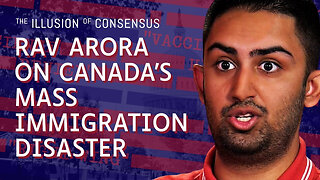Premium Only Content

Election Law Landscape Update
Rumble = https://rumble.com/user/SweetHomeStAugustine
POPULIST REVOLT = https://populistrevolt.com
In Pennsylvania, the Commonwealth Court, an appellate court in the state, issued a ruling recently holding that a change made by the legislature in 2019 to the law governing absentee ballots violated the state constitution.
In 2019, the legislature amended state law and turned Pennsylvania into a “no fault” absentee-voting state. However, in a lengthy ruling, the Commonwealth Court held that the legislature didn’t have the power to make that change.
Section 14 of Article VII of the state constitution authorizes the legislature to provide a method of voting for residents who will be “absent from the municipality of their residence because their duties, occupation or business require them to be elsewhere”; are “unable to attend at their proper polling places because of illness or physical disability”; or unable to vote at their polling place due to their “observance of a religious holiday.”
In New York, a second lawsuit has been filed against the New York City law that allows permanent resident aliens and those aliens authorized to work in the U.S. who have resided in New York City for at least 30 days to vote in local elections.
The first lawsuit asserts that the new law violates the New York state constitution, which makes citizenship a qualification to vote in all state, local, and municipal elections in New York.
The second lawsuit was filed by the Public Interest Legal Foundation (on whose board I serve) on behalf of four African American registered voters in New York City, including Deroy Murdock, a columnist and Fox News commentator.
This lawsuit is filed under the 15th Amendment to the U.S. Constitution, the last of the Reconstruction amendments ratified in 1870, which prohibits the right to vote being “denied or abridged … on account of race, color, or previous condition of servitude.”
The complaint claims that the New York City law violates the 15th Amendment because it was passed “with the impermissible racial purpose of intentionally abridging the voting strength of Black voters and other racial groups in New York City.”
On Feb. 7, in response to an emergency appeal by Alabama, the U.S. Supreme Court in a 5-4 decision in Merrill v. Milligan stayed a lower court decision that ordered Alabama to redraw its new congressional districts by Feb. 11, despite the absentee voting period for the state’s primary starting less than two months from now on March 30.
The lower court decision claimed that Alabama’s new congressional district plan, which was adopted following the 2020 census, violated Section 2 of the Voting Rights Act, which bans racial discrimination in voting.
It was an odd decision that itself may have violated Section 2. Why? Because Alabama has had seven congressional districts for more than 50 years, since 1970. Of those seven districts, it has had one “majority-minority” district in which black Alabamians are a majority of the voters and thus can elect “their candidate of choice” since 1992.
When the Alabama Legislature drew the new congressional districts, it maintained the status quo: seven congressional districts, one of which is a majority-minority black district.
Election Fraud
Finally, several new convictions for election fraud spanning the country, from Texas to California to Tennessee, illustrate that fraud does happen in our elections, contrary to what you constantly hear from the mainstream media and those opposed to commonsense reforms.
The convictions include Memphis Black Lives Matter chapter founder Pamela Moses submitted a false certificate claiming she was no longer on probation and thus was eligible to register and vote again. She was found guilty of registration fraud by a jury, and the judge admonished her for “tricking” the probation department and voting illegally six times.
Three individuals in Gregg County, Texas—including a county commissioner, his wife, and a campaign staffer—pleaded guilty to election fraud in the 2018 Democratic primary Longview City Council election.
They organized a scheme to harvest more than 100 absentee ballots by “assisting” voters with absentee- ballot requests, misleading them about the requirements for those ballots and filling out the applications, sometimes falsely claiming the voters were disabled.
And finally, in Compton, California, three individuals have pleaded guilty to illegally registering to vote at the address of a former member of the City Council, when they didn’t actually live in Compton.
-
 0:35
0:35
WSYM
3 years agoELECTION UPDATE
135 -
 LIVE
LIVE
BEK TV
22 hours agoTrent Loos in the Morning 4/30/2025
7,239 watching -
 15:35
15:35
The Illusion of Consensus
1 day agoRav Arora Warns Danger of Mass Immigration In Canada
5.21K3 -
 26:33
26:33
CatfishedOnline
23 hours agoI Sent $150k And Sold My Home For Online Love!
28.3K14 -
 7:37
7:37
The Shannon Joy Show
11 hours ago💀 Doctor Death: NY’s Suicide Bill
18.1K9 -
 19:05
19:05
This Bahamian Gyal
14 hours agoWhy would SHANNON SHARPE risk EVERYTHING for THIS?
13.1K5 -
 34:53
34:53
Uncommon Sense In Current Times
15 hours ago $1.77 earnedEconomist Breaks Down Trump Tariffs | Dr. Jonathan Newman
23.6K5 -
 13:23
13:23
NinjaGamblers
22 hours ago $0.30 earnedMasaniello Betting Strategy at Roulette: Guaranteed Wins Every Time??
10.9K3 -
 1:00:43
1:00:43
Trumpet Daily
19 hours ago $4.13 earnedCanada Hates Trump More Than the Trudeau Disaster - Trumpet Daily | Apr. 29, 2025
14.2K26 -
 53:01
53:01
State of the Second Podcast
16 hours agoDisarming Americans One Law at a Time (ft. Krate Tactical)
13.6K2